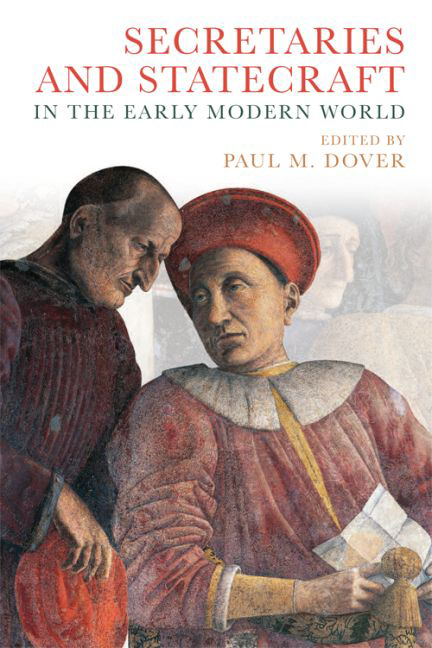Book contents
- Frontmatter
- Contents
- List of Contributors
- 1 Introduction: The Age of Secretaries
- 2 Records, Politics and Diplomacy: Secretaries and Chanceries in Renaissance Italy (1350–c. 1520)
- 3 Mercurino di Gattinara (1465–1530): Imperial Chancellor, Strategist of Empire
- 4 ‘This continuous writing’: The Paper Chancellery of Bernhard Cles
- 5 Parables and Dark Sentences: The Correspondence of Sir William Cecil and William Maitland (1559–73)
- 6 Axel Oxenstierna and Swedish Diplomacy in the Seventeenth Century
- 7 Statecraft and the Role of the Diplomat in Ducal Savoy: The Career of Alessandro Scaglia (1592–1641)
- 8 Richelieu, Mazarin and Italy (1635–59): Statesmanship in Context
- 9 The Learned Ideal of the Mughal Wazīr: The Life and Intellectual World of Prime Minister Afzal Khan Shirazi (d. 1639)
- 10 Reconsidering State and Constituency in Seventeenth-Century Safavid Iran: The Wax and Wane of the Munshi
- 11 Choreographers of Power: Grigorii Kotoshikhin, State Secretaries and the Muscovite Royal Wedding Ritual
- 12 Eberhard von Danckelman and Brandenburg's Foreign Policy (1688–97)
- 13 Chancellor of State: Prince Wenzel Anton Kaunitz, the Habsburg Foreign Office and Foreign Policy in the Era of Enlightened Absolutism
- Index
6 - Axel Oxenstierna and Swedish Diplomacy in the Seventeenth Century
Published online by Cambridge University Press: 21 November 2017
- Frontmatter
- Contents
- List of Contributors
- 1 Introduction: The Age of Secretaries
- 2 Records, Politics and Diplomacy: Secretaries and Chanceries in Renaissance Italy (1350–c. 1520)
- 3 Mercurino di Gattinara (1465–1530): Imperial Chancellor, Strategist of Empire
- 4 ‘This continuous writing’: The Paper Chancellery of Bernhard Cles
- 5 Parables and Dark Sentences: The Correspondence of Sir William Cecil and William Maitland (1559–73)
- 6 Axel Oxenstierna and Swedish Diplomacy in the Seventeenth Century
- 7 Statecraft and the Role of the Diplomat in Ducal Savoy: The Career of Alessandro Scaglia (1592–1641)
- 8 Richelieu, Mazarin and Italy (1635–59): Statesmanship in Context
- 9 The Learned Ideal of the Mughal Wazīr: The Life and Intellectual World of Prime Minister Afzal Khan Shirazi (d. 1639)
- 10 Reconsidering State and Constituency in Seventeenth-Century Safavid Iran: The Wax and Wane of the Munshi
- 11 Choreographers of Power: Grigorii Kotoshikhin, State Secretaries and the Muscovite Royal Wedding Ritual
- 12 Eberhard von Danckelman and Brandenburg's Foreign Policy (1688–97)
- 13 Chancellor of State: Prince Wenzel Anton Kaunitz, the Habsburg Foreign Office and Foreign Policy in the Era of Enlightened Absolutism
- Index
Summary
Viewed from a perspective unavailable to him, the Swedish Chancellor Axel Oxenstierna (1583–1654) appears to have played a minor role in what Victor Lieberman has suggested was a process of ‘strangely parallel’ state formations distinguished by increased interstate competition, administrative capacity, commercial exchange, and cultural and religious exclusivity that reshaped Eurasian polities from 1450 until 1830 from the Chao Phraya basin to the Vistula delta, from La Rochelle to Edo. Oxenstierna could serve as a textbook example of the ‘ratchet-like’ accumulation of administrative expertise, in which royal servants altered domestic practices by imitating foreign theories and practices. From a narrower perspective, historians might depict Oxenstierna as a statesman playing a role in the elaboration of European diplomatic practice, or as one of the chief ministers that distinguished early seventeenth- century European governance such as Richelieu, Olivares, Buckingham and Mazarin.
In Sweden, historians, government officials and even newspaper columnists invoke Oxenstierna as the founder of modern Swedish administration. Unlike Richelieu, who tends to overshadow Louis XIII in the scholarship, Oxenstierna has been overshadowed by the monarchs he served, Gustavus Adolphus and Christina. Oxenstierna may have encouraged this focus, as he himself began to compose a biography of Gustavus Adolphus; Hugo Grotius had refused a request to write one, arguing that Oxenstierna was more suitable. The major historical work Oxenstierna patronised, Bogislaw Philip von Chemnitz's Königlich Schwedischer in Teutschland geführter Krieg (The Swedish Kingdom in the Recent War in Germany), while featuring the chancellor, did not elevate him to the central figure of the day, nor did it organise the narrative around him and his actions. Perhaps because of his importance to the history of Sweden and Europe more broadly, the volume of material was so overwhelming that the first biography to cover his entire lifespan was not completed until 2002. Institutional historians in the first half of the twentieth century celebrated Oxenstierna's role in the founding of many central institutions of the Swedish state, including a system of regular diplomatic representation, the elaboration of a chancery and archive, and the establishment of a postal system.
- Type
- Chapter
- Information
- Secretaries and Statecraft in the Early Modern World , pp. 115 - 139Publisher: Edinburgh University PressPrint publication year: 2016

